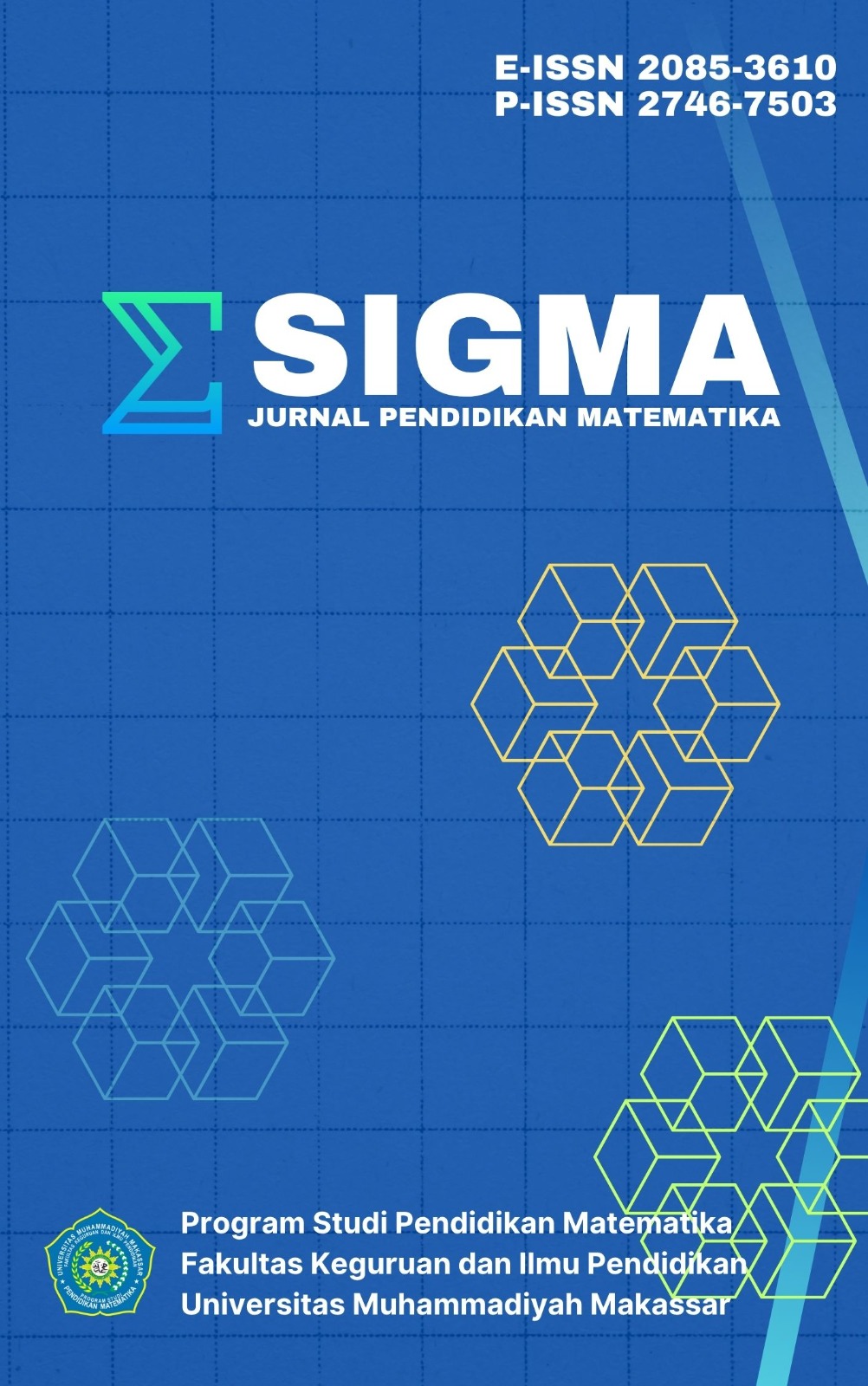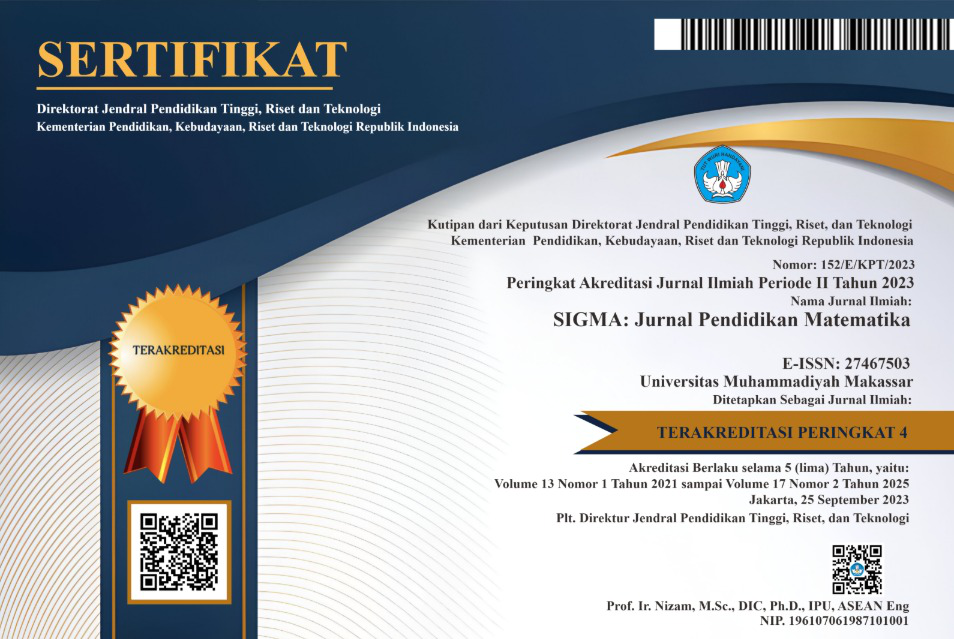EFEKTIVITAS PEMBELAJARAN PROBLEM BASED LEARNING TERHADAP BERPIKIR KRITIS BERDASARKAN SELF-CONFIDENCE SISWA SMP
DOI:
https://doi.org/10.26618/sigma.v17i2.18444Keywords:
Problem Based Learning, kemampuan berpikir kritis, self-confidence, pembelajaran matematika, bangun datarAbstract
Abstrak
Dalam pendidikan modern, siswa harus memiliki keterampilan berpikir kritis yang didukung oleh kepercayaan diri dalam pembelajaran matematika. Salah satu masalah utama dalam penelitian ini adalah peningkatan keterampilan berpikir kritis sekolah menengah yang disebabkan oleh guru. Tujuan dari penelitian ini adalah untuk menilai seberapa efektif model pembelajaran berbasis masalah (PBL) untuk keterampilan berpikir kritis. Ini terjadi dengan kepercayaan sekolah menengah yang bangun datar. Studi ini menggunakan pendekatan kuantitatif dan desain kuasi-eksperimental. Secara khusus, desain kelompok kontrol hanya digunakan dalam desain faktorial 2x3 setelah pengujian. Populasi penelitian adalah siswa kelas VII SMP Negeri 3 Mojokerto tahun pelajaran 2024/2025 sebanyak 251 siswa, dengan sampel 61 siswa yang dipilih menggunakan cluster random sampling. Instrumen penelitian meliputi angket self-confidence dengan skala Likert dan tes kemampuan berpikir kritis berbentuk uraian pada materi bangun datar. Teknik pengumpulan data dilakukan melalui pemberian angket dan tes, kemudian dianalisis menggunakan uji prasyarat dan analisis variansi dua jalan. Hasil penelitian menunjukkan tidak terdapat perbedaan signifikan kemampuan berpikir kritis antara siswa yang belajar dengan PBL dan pembelajaran langsung (sig. = 0,422 > 0,05). Self-confidence juga tidak berpengaruh signifikan terhadap kemampuan berpikir kritis (sig. = 0,543 > 0,05), dan tidak terdapat interaksi antara model pembelajaran dan self-confidence (sig. = 0,227 > 0,05). Disimpulkan bahwa efektivitas PBL tidak lebih superior dibandingkan pembelajaran langsung dalam meningkatkan kemampuan berpikir kritis siswa pada konteks penelitian ini.
Abstract
Twenty-first-century education demands that students possess critical thinking abilities supported by self-confidence in mathematics learning. The low critical thinking ability of junior high school students, exacerbated by conventional teacher-centered learning, constitutes the main problem in this research. This study aims to analyze the effectiveness of the Problem Based Learning (PBL) model on critical thinking ability in terms of junior high school students' self-confidence in plane geometry material. The research method employed a quantitative approach with a quasi-experimental design, specifically the non-equivalent posttest-only control group design with a 2×3 factorial arrangement. The research population consisted of 251 seventh-grade students at SMP Negeri 3 Mojokerto in the 2024/2025 academic year, with a sample of 61 students selected using cluster random sampling. Research instruments included a self-confidence questionnaire using a Likert scale and a critical thinking ability test in essay form on plane geometry material. Data collection techniques were conducted through questionnaire administration and testing, then analyzed using prerequisite tests and two-way analysis of variance. The research results show no significant difference in critical thinking ability between students learning with PBL and direct instruction (sig. = 0.422 > 0.05). Self-confidence also had no significant effect on critical thinking ability (sig. = 0.543 > 0.05), and there was no interaction between learning model and self-confidence (sig. = 0.227 > 0.05). It is concluded that the effectiveness of PBL is not superior to direct instruction in improving students' critical thinking ability in the context of this research.
References
Coutinho, M. V. C., Thomas, J., Fredricks-Lowman, I., Alkaabi, S., & Couchman, J. J. (2024). Unskilled and unaware: second-order judgments increase with miscalibration for low performers. Frontiers in Psychology, 15. https://doi.org/10.3389/fpsyg.2024.1252520
Davis, B., & Sumara, D. (2014). Complexity and education: Inquiries into learning, teaching, and research. In Complexity and Education: Inquiries into Learning, Teaching, and Research. https://doi.org/10.4324/9780203764015
Dochy, F., Segers, M., Van den Bossche, P., & Gijbels, D. (2003). Effects of problem-based learning: A meta-analysis. Learning and Instruction, 13(5). https://doi.org/10.1016/S0959-4752(02)00025-7
Fariji, I. (2019). Pengaruh Model Pembelajaran Problem-Based Learning (PBL) dan Probing-Prompting (PP) terhadap Kemampuan Berpikir Kritis Siswa ditinjau dari Kepercayaan Diri (Self-Confidence). Integral : Pendidikan Matematika, 10(1). https://doi.org/10.32534/jnr.v10i1.636
Fauziah, N. I., ’Adna, S. F., & Hendrastuti, Z. R. (2023). Efektivitas Model Pembelajaran Creative Problem Solving Terhadap Kemampuan Berpikir Kritis Ditinjau Dari Self Confidence Siswa Smp Negeri 1 Magelang Pada Materi Garis Dan Sudut. Delta: Jurnal Ilmiah Pendidikan Matematika, 11(2). https://doi.org/10.31941/delta.v11i2.2429
Knof, H., Berndt, M., & Shiozawa, T. (2024). Prevalence of Dunning-Kruger effect in first semester medical students: a correlational study of self-assessment and actual academic performance. BMC Medical Education, 24(1). https://doi.org/10.1186/s12909-024-06121-7
Lavidas, K., Papadakis, S., Manesis, D., Grigoriadou, A. S., & Gialamas, V. (2022). The Effects of Social Desirability on Students’ Self-Reports in Two Social Contexts: Lectures vs. Lectures and Lab Classes. Information (Switzerland), 13(10). https://doi.org/10.3390/info13100491
Manuaba, I. B. A. P., No, Y., & Wu, C. C. (2022). The effectiveness of problem based learning in improving critical thinking, problem-solving and self-directed learning in first-year medical students: A meta-analysis. PLoS ONE, 17(11 November). https://doi.org/10.1371/journal.pone.0277339
McLeod, D. B., Cronbach, L. J., & Snow, R. E. (1978). Aptitudes and Instructional Methods: A Handbook for Research on Interactions. Journal for Research in Mathematics Education, 9(5). https://doi.org/10.2307/748778
Miller, A. (2012). Investigating social desirability bias in student self-report surveys. Association for Institutional Research, 36(1).
Ramdan, Z. M., Veralita, L., Rohaeti, E. E., & Purwasih, R. (2018). ANALISIS SELF CONFIDENCE TERHADAP KEMAMPUAN PEMECAHAN MASALAH MATEMATIS SISWA SMK PADA MATERI BARISAN DAN DERET. AKSIOMA: Jurnal Program Studi Pendidikan Matematika, 7(2). https://doi.org/10.24127/ajpm.v7i2.1335
Setiawan, A., Rochmad, & Rachmani Dewi Nuriana. (2021). Hubungan Kemampuan Berpikir Kritis dengan Self Confidence Siswa Kelas IX Materi Bangun Ruang Sisi Lengkung. Jurnal Pendidikan Dan Kebudayaan Missio, 13(2).
Shabani, K., Khatib, M., & Ebadi, S. (2010). Vygotsky’s Zone of Proximal Development: Instructional Implications and Teachers’ Professional Development. English Language Teaching, 3(4). https://doi.org/10.5539/elt.v3n4p237
Siregar, M. B., & Narpila, S. D. (2023). Influence of Problem-Based Learning Model on Students’ Critical Thinking Ability and Learning Motivation in Mathematics Learning. Numerical: Jurnal Matematika Dan Pendidikan Matematika, 7(2). https://doi.org/10.25217/numerical.v7i2.3884
Ulfa, D., Rahmi, D., & Revita, R. (2019). Pengaruh Penerapan Model Pembelajaran Core Terhadap Kemampuan Pemecahan Masalah Matematis Berdasarkan Self-Confidence Siswa SMP/MTS. Jurnal Cendekia : Jurnal Pendidikan Matematika, 3(2). https://doi.org/10.31004/cendekia.v3i2.124
Wulandari, I. P., Rochmad, R., & Sugianto, S. (2020). Integrated Between DAPIC Problem Solving Model and RME Approach to Enhance Critical Thinking Ability and Self Confidence. Anatolian Journal of Education, 5(2). https://doi.org/10.29333/aje.2020.526a
Downloads
Published
Issue
Section
License
Copyright (c) 2025 SIGMA: JURNAL PENDIDIKAN MATEMATIKA

This work is licensed under a Creative Commons Attribution-ShareAlike 4.0 International License.
With the receipt of the article by the SIGMA: Jurnal Pendidikan Matematika Editorial Board and the decision to be published, then the copyright regarding the article will be diverted to SIGMA: Jurnal Pendidikan Matematika.
Universitas Muhammadiyah Makassar as the publisher of SIGMA: Jurnal Pendidikan Matematika hold the copyright regarding all the published articles in this journal.Universitas Muhammadiyah Makassar has the right to multiply and distribute the article and every author is not allowed to publish the same article that was published in this journal.
The manuscript authentic and copyright statement submission can be downloaded ON THIS FORM.






